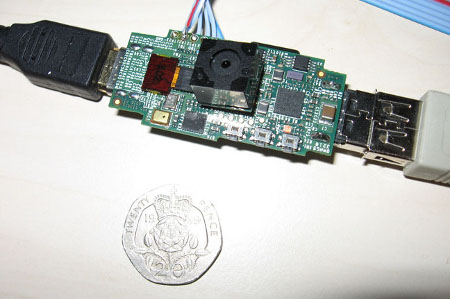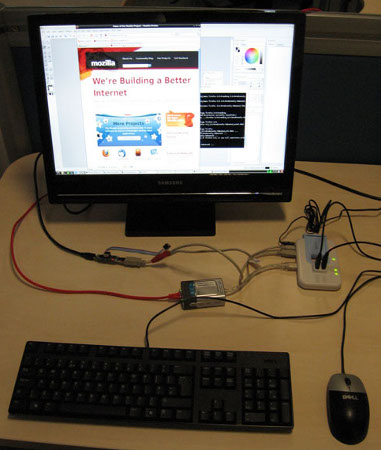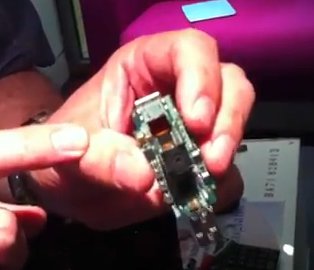ARM11 Linux educational computer aims for $25 pricetag
May 6, 2011 — by Eric Brown — from the LinuxDevices Archive — 5 viewsU.K. games developer David Braben has launched an OLPC-like foundation called Raspberry Pi, hoping to sell a tiny ARM/Linux computer aimed at K12 computer education for as little as $25. Braben demonstrated a single board computer (SBC) prototype running Ubuntu 9.04 on a 700MHz, OpenGL-enabled ARM11 processor with 128MB SDRAM, HDMI, USB, and SD connectivity, supporting 1080p video.
The Raspberry Pi Foundation has designed its $25 Linux computer prototype as a flexible platform for computer education in both the developing and developed worlds. The foundation, said to be registered as a U.K. charity, plans to develop, manufacture, and distribute the USB-key sized computer within the next 12 months.

Raspberry Pi prototype with 12-megapixel camera option on top
The computer has a USB port on one end and an HDMI port on the other to connect a keyboard and display, respectively. The device will also support touchscreens to create a tablet device, says the foundation. The Ubuntu 9.04-based device lacks Wi-Fi or Ethernet, but web connections can presumably be made via the USB port, with the help of a USB hub.

Raspberry Pi prototype bringing up the web, apparently with the help of a USB hub
(Click to enlarge)
- Processor — 700MHz ARM11 with OpenGL ES 2.0
- Memory — 128MB SDRAM
- Memory expansion — SD/MMC/SDIO slot
- Display:
- 1080p30 H.264 high-profile decode
- composite output
- HDMI output
- I/O — USB 2.0; GPIO
- Software — Ubuntu 9.04, Iceweasel, KOffice, Python
The processor was not listed, perhaps because it may change by ship date. One possibility could be the 800MHz Telechips TTC8902 ARM11 processor, which has a video digital signal processor (DSP) and Open GL ES 2.0 3D graphics acceleration. (This processor is found in a number of low-cost Linux and Android tablets, such as the Coby Electronics Kyros.)
The goal of Raspberry Pi is to encourage direct hands-on experimentation in computer education, something missing from most current curricula, says Braben. In this, as well as its charitable foundation, the project appears to imitate the U.S.-based One Laptop Per Child (OLPC) foundation. Although the XO tablets OLPC is seeding throughout the world are general-purpose educational devices, their Linux-based Sugar operating system and related apps have a K12 computing curriculum focus, encouraging hands-on experimentation and creativity.

David Braben showing off computer at BBC News
The $25 price may be possible because the device is not only missing a keyboard — like the upcoming XO-3 and the still vaporish $35 tablet being developed by the Indian government — but also omits the display. Still, one would assume that a considerable degree of charitable subsidization might be necessary to push out a $25 ARM11 computer with this device's HD-ready ARM11 processor and other extras.
Last year, for example, the open platform Hawkboard SBC went on sale for $89, with an ARM9-based, DSP-enabled Texas Instruments OMAP-L138. A Cherrypal Asia netbook with an ARM9-based Via VT 8505 processor clocked at 533MHz is available for $99, and $99 Android tablets have appeared such as the Maylong M-150.
Raspberry Pi prototype demonstrated by David Braben on YouTube
Source: Raspberry Pi Foundation; BBC News
(Click to play)
The Raspberry Pi computer is expected to ship within 12 months for a price of $25. More information may be found at the Raspberry Pi Foundation. The company is looking for open source educational projects that would like to collaborate with the project.
This article was originally published on LinuxDevices.com and has been donated to the open source community by QuinStreet Inc. Please visit LinuxToday.com for up-to-date news and articles about Linux and open source.